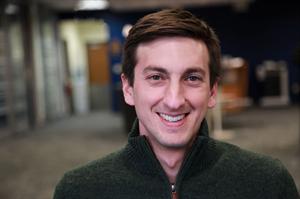
What do Rodney King, the LAPD, and DePauw University have in common? Find out in the new book “Policing Los Angeles: Race Resistance, and the Rise of the LAPD.”
On Monday, former DePauw professor Max Felker-Kantor returned to campus to talk about his new book “Policing Los Angeles.” Felker-Kantor explained how he became interested in the LAPD and why he felt it was necessary to publish his story. “Looking at policing is important,” he said, “If any of you have been looking at the news in the last decade --Ferguson, Baltimore-- policing is important, and people are talking about it…this is the context in which I researched this book. These are the moments I was writing from.” Felker-Kantor believes that this is an important issue for everyone to consider and be involved in because it affects every day-to-day aspect of our society.
One thing that stands out about Felker-Kantor’s perspective is his holistic look at the issue of policing: from policy and reform to philosophy and human nature. “This is not new,” he said, “what we think might be a new problem in the present really is not new at all.”
Felker-Kantor points out the constantly shifting demographics of Los Angeles County and how the issue of police brutality there from the Watts Riots to Rodney King wasn’t just about black versus white. He said, “It was the police that maintained the boundaries of racial order” as the community shifted from a white majority to a Hispanic and African-American majority. This is why LA in the 1960s-90s is such a salient example of how policing works in society because its role was constantly changing and constantly met with protest.
Policing Los Angeles focuses a lot on the aforementioned uprisings: in the Watts neighborhood in 1965 and in the early 1990s following the court decision in the case of Rodney King. And one thing that he stresses is monumentally important and common of the two is that in both situations, the solution was more policing, and more violence in order to subdue the riots. “In 1965,” Felker-Kantor said, “the national guard was called in to assist in crowd control, more than 4,000 of them. In one week there were 34 people killed, 32 of them black, and almost all at the hands of the national guard.”
The moral of the story: violence only breeds violence. One student then remarked, “even at DePauw, with the recent bias incidents, the response is to add more police.” Felker-Kantor would argue that this is almost never the answer. “Activism [as seen in Watts and with Rodney King] can be successful, and we need to support it, but we also have to be critical of the role we want our police to play in society,” he said.
Felker-Kantor is optimistic for the future of policing. He cites the demographics of the 1960s LAPD as a major factor in their inability to justly serve the needs of the community. At that time, he says, “300 out of 5,000 LAPD officers were black,” and “83 percent of LAPD officers lived outside of the city.”
As long as our law enforcement does not represent the people, Felker-Kantor would argue that it cannot truly protect us. But this trend is changing and as long as it continues to move in the direction of inclusivity and transparency, we might see a whole new kind of police in America in the future.
